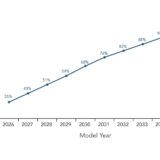
CARB to hold hearing on April 27 on 100% ZEV truck proposal
On April 27, 2023, the California Air Resources Board (CARB) will conduct a public hearing to consider the Proposed Advanced Clean Fleets Regulation. The meeting, which will be in hybrid format, will commence at 9:00 am and may continue on April 28.
The proposed regulation would establish a 100% zero-emission vehicles (ZEV) sales requirement on medium- and heavy-duty truck manufacturers and would require certain fleet owners to transition to zero-emissions medium- and heavy-duty vehicles from 2024 to 2042. The proposal was first presented at a public hearing held on October 27, 2022.
The proposed regulation would include medium- and heavy-duty vehicles, off-road yard trucks, and light-duty mail and package delivery vehicles. Affected fleets include drayage truck operators, which move shipping containers via highways between hubs, railway terminals, seaports, or warehouses, state and local government, federal government, and high priority fleets. High priority fleets are entities that own, operate, or control a total of 50 or more vehicles with a gross vehicle weight rating (GVWR) greater than 8,500 pounds or are entities with USD50 million or more in gross annual revenue.
According to CARB, the “clean air agency” of the U.S. state of California, which has the largest population among the 50 states, the proposed regulation is critical to meeting state and federal air quality standards, protecting public health, and achieving the state’s climate goals which require a transition from the conventional combustion technologies to zero-emission everywhere feasible.
Promoting the development and use of zero-emission trucks will contribute to the goals set by the Governor’s Executive Order N-79-20 and the Sustainable Freight Action Plan, and will help achieve emission reductions as outlined in the State Implementation Plan, Senate Bill (SB) 350 (de León, Chapter 547, Statutes of 2015), Assembly Bill 32 (Nuñez, Chapter 488, Statutes of 2006), and SB 32 (Pavley, Chapter 249, Statutes of 2016), and Assembly Bill 1279.
This effort is part of a broader strategy to increase clean, affordable transportation options such as zero-emission technologies, innovative methods to improve freight activity, and efficiency of transportation systems in California.
At the upcoming Board Hearing, the board will consider the Final Environmental Analysis, Response to Comments, and Resolution for the Proposed Regulation. All regulatory documents are available on CARB’s Rulemaking webpage.
Since the federal regulation sees a slower transition, California needs an exemption from the U.S. Environmental Protection Agency (EPA) to adopt these more stringent regulations.
The Truck and Engine Manufacturers Association (EMA), which represents the largest truck manufacturers in the country, said that any exemption would have repercussions beyond the state’s borders: six other states, which together with California account for about 20% of nationwide sales of heavy-duty vehicles, have already committed to following California’s stricter standards. But they cannot implement their plans until the EPA grants California an exemption.





.png)




